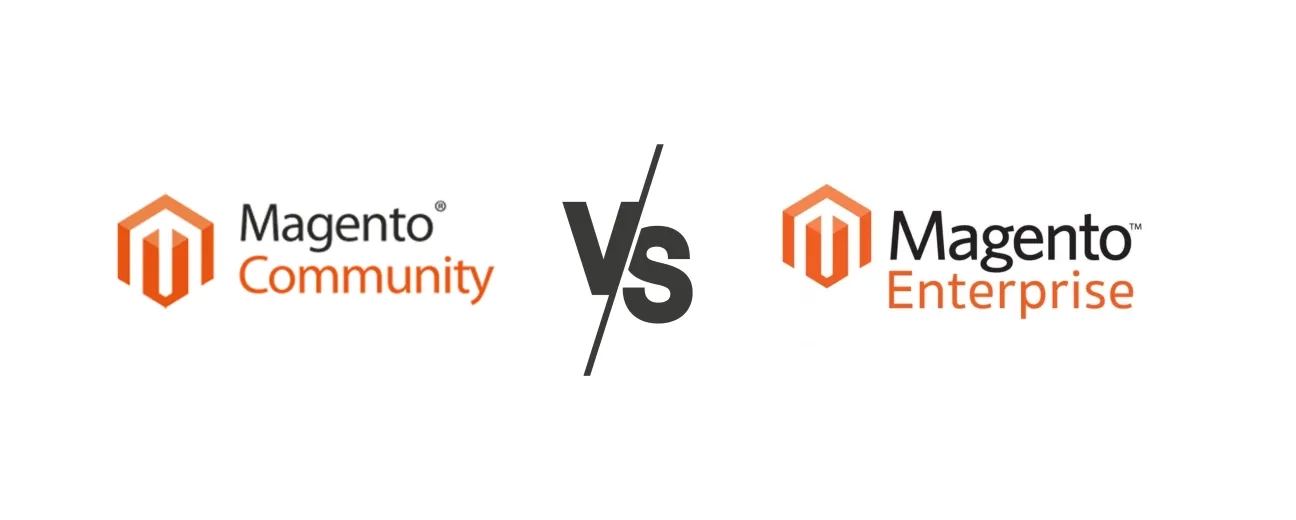
We’re excited to hear your project.
Let’s collaborate!

So you've made up your mind: it's Magento “fuel” that will be powering your e-commerce website. And now you're facing challenge no. 2: Magento Enterprise vs Magento Community!
Which one of the 2 Magento platform's editions is right for you? What are the key differences after all?
Which one's best suited to your current feature needs? And how about your daring goals and growth plans? Which one's scalable enough to accommodate your expansion plans?
The quickest/easiest/surest method to “find your match”: confronting your current requirements with each one of the 2 Magento editions' sets of features and functionalities.
Note: the method is the same if you're having a Magento vs Drupal Commerce "dilemma" instead, for instance.
Then draw the line and just do the math!
So, without further ado, let's dig up the:
With or without a price tag on.
This is the most rudimentary “Magento Enterprise vs Magento Community” comparison that one could make.The first one does come at a price, while the open source version is free to download off the internet and, implicitly, free to use.
And now the question that arises is: does the price tag come with added value, as well?
Without question!
The Magento Commerce edition — merging, since June 2017, the Enterprise and the Magento Cloud Edition — comes not with 1, but with 2 price tags on. Along with a heavy load of enterprise-level features and high-end functionalities.
And it's your own needs and goals that will tell you whether... it's worth it. Whether a free variant, with basic online selling capabilities or a bulky feature set, with a heftier price tag on, suits you best.
The open-source community edition is Magento's downloadable version. And, as you can expect, it provides much of the same functionality, same basic performance and shares the core features with its enterprise counterpart.
And here are some of these core features that you can power your e-commerce business plans with and get your functional online store up and running in no time:
A word of caution:
Determine your site's specific goals and needs right from its planning phases.This because implementing specific functionalities from your “wishlist” might require you to install additional plugins and to craft some custom code.
It does if your answer is “Yes” to most of the following questions:
In short: Magento's open source community edition (CE) is built, from the ground up, with the basic needs of small e-commerce business owners in mind.
It's a turnkey solution for small sites.
Note: having just a few products doesn't necessarily mean that your site's needs are basic. Therefore, this is no indicator that you should opt for Magento Open Source.
Just think these growth plans through and the sooner the better:
Do set up your e-commerce goals at this phase of the project!
For once you've got your site running on Magento Community (or Open Source), switching to Magento commerce will be more challenging than you expect:
So, take some time to think about the future, your e-Commerce site's future...
Since “upgrading” it, later on, to Magento Enterprise, comes with inconveniences and compromises that you'll have to make (e.g. losing some of your team's hard work).
Magento Commerce — the 2-in-1 Enterprise & Cloud edition of the platform — provides you with enterprise-level features right out of the box.
Along with the price tag comes the added value transposed into a set of online selling capabilities that you don't get with its open source counterpart. So, do consider this when you're having a Magento Enterprise vs Magento Community dilemma.
Capabilities geared at meeting your enterprise online store's complex demands from an e-Commerce platform.
And here are the enterprise edition's top features:
In short: Magento Commerce offers you more out-of-the-box functionality as compared to Magento Community, where you'd need to engage in custom coding and extension implementation to have these features “injected” into your site)
… you plan to launch a large, enterprise-sized online store or a small-scale one, but you're “nurturing” major expansion plans!
In this case, the Magento Enterprise vs Magento Community “dilemma” is an easy one: Magento Commerce (now including the enterprise version, as well) is perfect for you!
For your big, “needy” website site, that you expect to:
… definitely needs a more robust, premium-grade features-packed platform.
And Magento Commerce is the one.
The END!
So, how about now? Do you find it any easier to decide for one of the 2 Magento editions? Do any of the eCommerce business needs and expectations that I've outlined here match your own?
If so, which of the 2 feature sets — Magento Enterprise's and Magento Community's — suits them best?

We’re excited to hear your project.
Let’s collaborate!